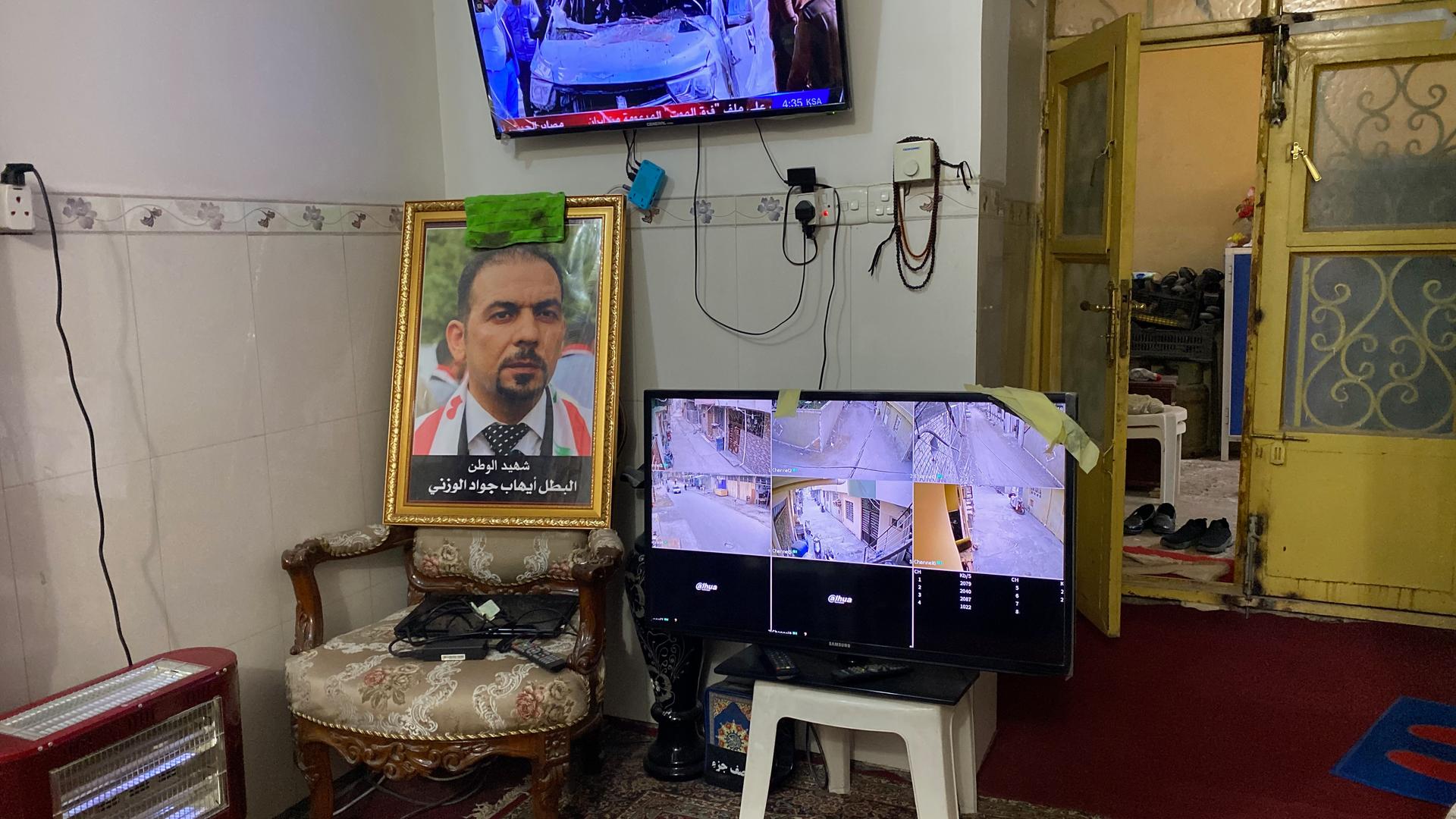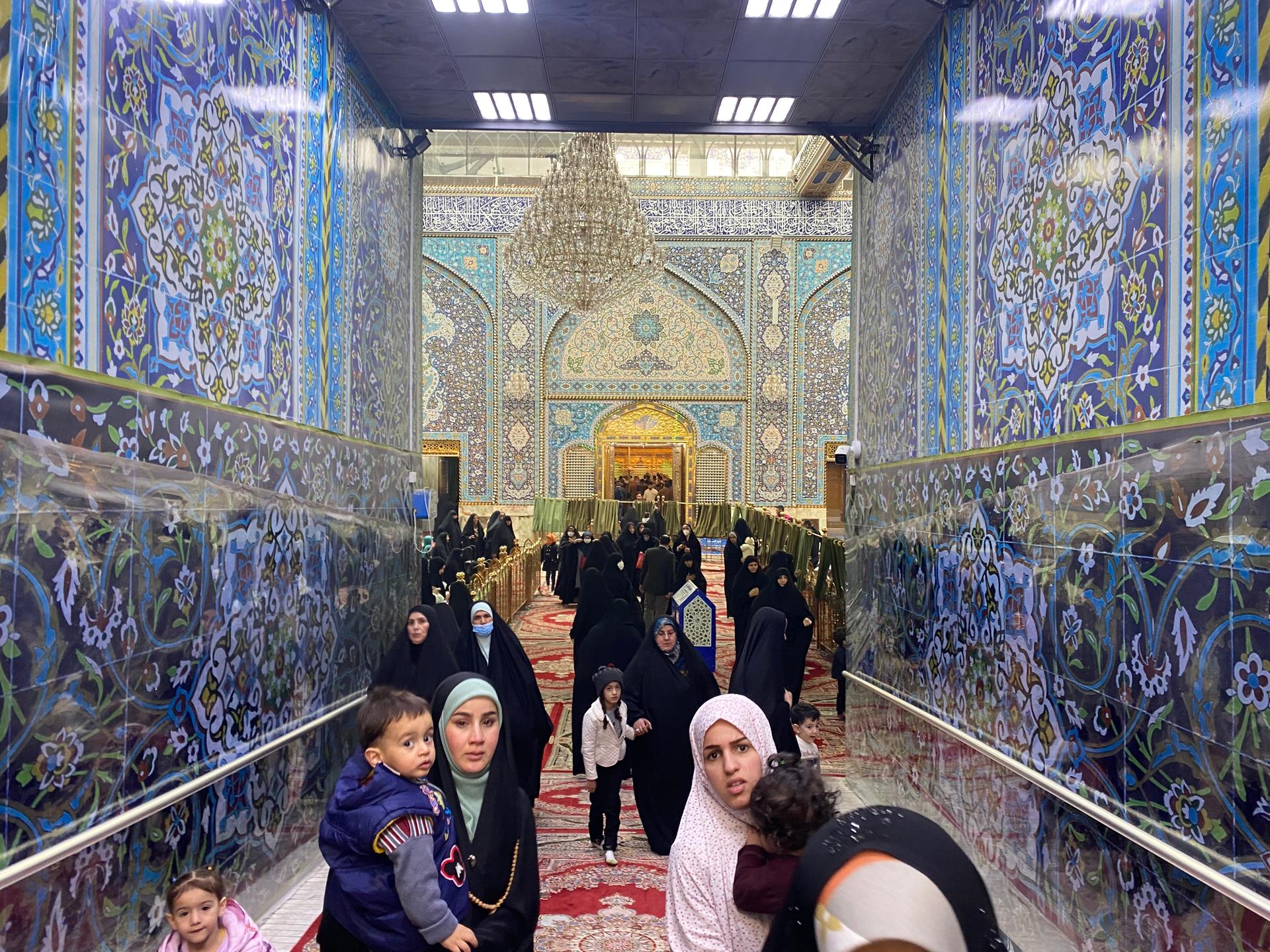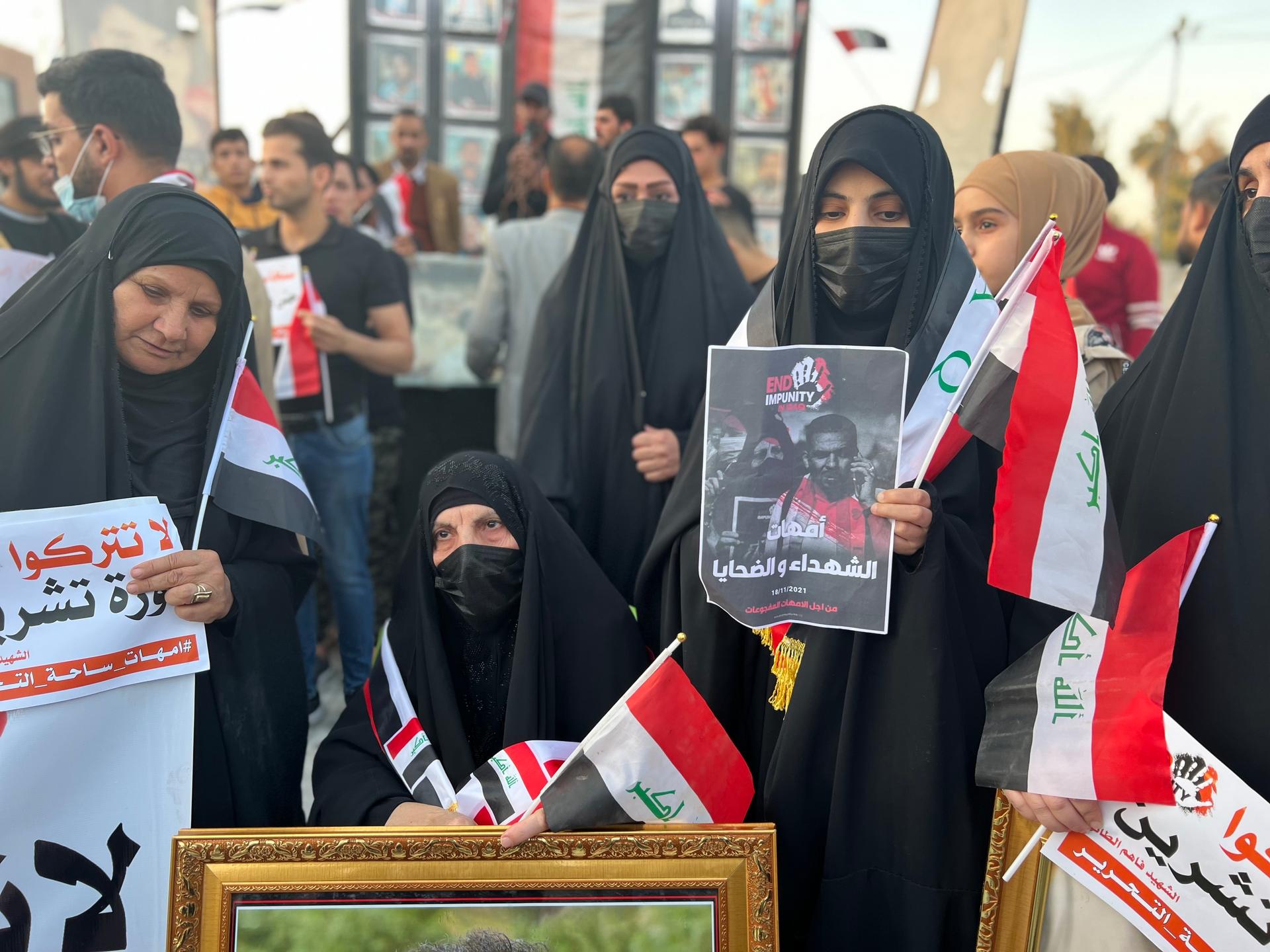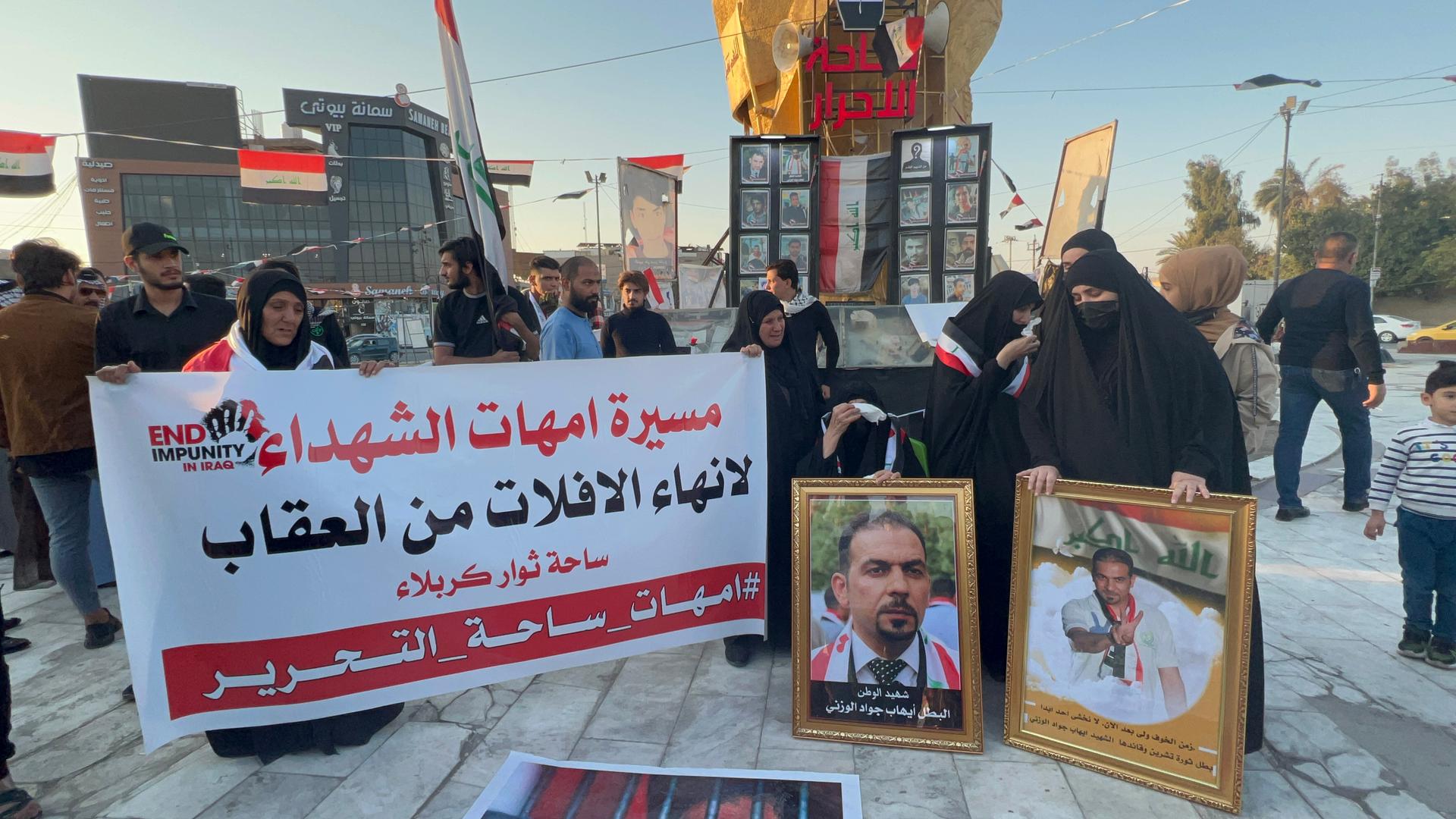Samira Abbas, known to most as Umm Ehab, or “the mother of Ehab,” keeps a portrait of her son, Ehab al-Wazni, propped on a chair in the living room of her home in Iraq’s holy city of Karbala.
It is this oversized picture, framed in gold and topped by a rag crusted with Wazni’s blood, that Abbas often brings with her to protests. Since Wazni was shot dead by a gunman in May, Abbas has made it her life’s mission to secure justice for her son, who has become a symbol of the impunity that Iraqi activists face.
“He used to call me every day to check on me and ask if I needed anything — ask if he should pick up bread. But that day, he didn’t call. I got worried. I opened the door to check the alley.”
“He used to call me every day to check on me and ask if I needed anything — ask if he should pick up bread. But that day, he didn’t call. I got worried. I opened the door to check the alley,” Abbas said, seated across the room from a TV monitor connected to multiple security camera feeds of the narrow street leading to their home.
Related: ‘I had no life left here’: Iraqi Kurds are at the center of the migration crisis in Europe
“I went back inside, but then I heard our neighbor screaming, ‘Umm Ehab. They killed your son,’” Abbas recalled.
Wazni was one of the most recognizable faces of a once-vibrant protest movement that began in late 2019. Iraqis took to the streets demanding an end to the corrupt political order that has gripped Iraq for the better part of two decades. They asked for jobs, better services and an end to Iranian influence in Iraq.

Abbas is becoming a regular fixture on Iraqi TV and has launched a sit-in outside the governor’s office. She alleges that her son was targeted on the orders of Qasim Musleh, the leader of the Iran-backed Tafuf Brigade.
Abbas isn’t alone in her fight for her son. Local media in recent months has been flooded with the voices of Iraqi mothers defiantly naming — at great personal risk — some of the most influential men in the country as responsible for their children’s killings.
Related: Drought in Iraq and Syria could totally collapse food system for millions, aid groups warn
Hundreds of activists have been killed during demonstrations, but also in targeted assassinations widely blamed on pro-Iran militias. Many of these killings take place outside of the victims’ homes, in full view of security cameras, and sometimes even in the middle of the day.
When Wazni was killed, eerie CCTV footage of a gunman calmly walking up to his car with a rifle and shooting him dead before hopping on the back of a getaway motorcycle circulated across the internet.
Another mother, Umm Muhanad, also identified in the media as Shahla Younis, has publicly said influential Shiite cleric Muqtada al-Sadr, whose political bloc won the largest number of seats in October’s parliamentary elections, is responsible for her son Muhanad al-Qaisi’s death. He died when the strongman’s supporters stormed a protest in the southern city of Najaf in February.
“Umm Muhanad was the first to speak out about her son’s loss on a more vocal level. And then, there were other mothers who also spoke out about their losses, but then Umm Ehab stepped up the game.”
“Umm Muhanad was the first to speak out about her son’s loss on a more vocal level. And then, there were other mothers who also spoke out about their losses, but then Umm Ehab stepped up the game,” said Ruba al-Hassani, a postdoctoral research associate with the University of Lancaster in the UK, who has followed the situation.
Hassani said that the failure to hold the powerful to account has pushed these women to use their own status as mothers as the moral compass of Iraqi society to publicly shame officials.
“They want justice. And they can only do so much there. The justice system is flawed, it’s politicized. It hasn’t been giving them the closure that they need,” she said in a phone interview.

In May, Iraq’s prime minister, Mustafa al-Kadhimi, who has promised to reign in Iran-backed militias, ordered the arrest of Muslah, of the Tafuf Brigade. Some unnamed sources speaking to the media attributed it to the murders of Wazni and another activist. The bold move led to a standoff with powerful armed groups who started circling central Baghdad in pickup trucks, weapons in tow.
Musleh was soon released.
In response, Abbas set up a tent in front of the governor’s office during the sweltering Iraqi summer.
Related: Iraq needs to reclaim its cultural past to develop its future, art historian says
“In front of the governor’s office, I said, ‘I’m not an Iranian, nor a foreigner. I’m an Iraqi,’” she said, adding that it was a frequent refrain of Wazni’s in his protests.
“The police tried to dismantle her tent and she still stood there, defiant of all these uniformed men around her, she still stood there,” Hassani recalled, saying Abbas’ respectability as an elderly mother, in a way, protects her from the same level of violence younger protesters face.

“Mothers are very sacred. And so, when this woman and her abaya — the black, you know, shapeless, formless garb that she was wearing — men in uniform can never touch her. If they do, they would be in deeper hell,” she said.
Related: Drone attack on Iraq’s prime minister raises concerns of more violence
But this status has not prevented Abbas and other mothers from receiving threats intended to pressure them into silence. Umm Muhanad has had to flee the country due to this kind of pressure, according to multiple sources acquainted with her.
Abbas said that she continues to speak out publicly because her heart is aching.
“I want my son. I know he’s dead and buried under the ground, but I want to know the criminal who killed my son; I want to see him.”
